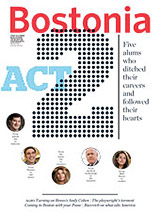Building on the legacy of her longtime predecessor, Phyllis Hoffman (CFA’61,’67), Hilary Field Respass, the new executive director of the Boston University Tanglewood Institute (BUTI), has been working behind the scenes this winter to boost the profile and long-term viability of the organization. Based in Lenox, Mass., in the rolling hills and fields near the Tanglewood Music Center, summer home to the Boston Symphony Orchestra, BUTI has offered rigorous musical training every summer to hundreds of gifted high school students since 1966.
Having played leading roles at a variety of prestigious institutions, from the Aspen Music Festival and School to the League of American Orchestras, Respass, a graduate of New England Conservatory, came to BU from her post as director of the community division of the Hartt School, the performing arts conservatory of the University of Hartford. Though she started officially last August, Respass spent many weekends in Lenox before that “just to get a sense of that magic,” she says. “I went out this summer and breathed the air, listened to the music, talked with faculty, talked with students. It was that same sense that I had in Aspen of, ‘We’re someplace special, we’re someplace that needs to be supported, preserved,’ particularly in this world of ours right now.”
As BUTI prepares to celebrate its 50th anniversary in 2016, Respass is working to address University concerns about rising costs and the need for more rigorous fundraising initiatives. Bostonia sat down with her recently to discuss how she’s faring, and what makes BUTI an important component of the College of Fine Arts School of Music and worthy of a life long into the future.
Bostonia: What in your background specifically prepared you for a program like this?
再保险
And you’re a gifted musician as well.
I was trained as a clarinetist and music educator. When interviewing for this position, I was thrilled to reconnect with H. Robert Reynolds, who conducts the BUTI Young Artists Wind Ensemble. I played in his wind ensemble at the University of Michigan many years ago. All of the conductors at BUTI are terrific artists and educators and, when combined with the talent of the students who join us each summer, the result is extraordinary. It is why I took this job.
There are many comparable programs, but BUTI seems to offer young people a different kind of experience.
Yes, BUTI students, faculty, staff, and alumni all speak of “the magic of Tanglewood,” which is sometimes difficult to describe more fully and hard for the rest of us to understand or appreciate from the outside. One alumna described it as “being pushed further” than she ever thought she could go while being “opened up and exposed to a world of music-making” that she had not known was possible. Others talk about the importance of having the independence, freedom, and responsibility to act with maturity and professionalism. Still others speak of the dual sense of intensity and comfort of being with students like themselves who feel just as passionately and seriously about music. I would say that, above all, BUTI is about artistry and empowerment in a place that has the program, resources, and the environment to transform students to levels higher than they ever thought possible.
Is it part of your mission to try to have BUTI be a feeder for BU?
Yes. Faculty from the School of Music serve as BUTI faculty, which is one important and effective recruiting effort, and CFA admissions staff regularly do presentations and information sessions for BUTI students. That said, we can continue to build on these efforts to ensure that all BUTI students are aware of the wide range of excellent opportunities that BU presents through all of its schools. Many BUTI students are interested in pursuing professional careers in music and are seeking a conservatory/music school track; others want to pair music studies with another major. Our job is to help students think about these decisions and offer them information about what BU has to offer across all of its programs.
Are there incentives of any kind?
We are currently developing a joint application such that rising senior applicants only need to do one for both programs. There are certainly more incentives to explore.
What are your responsibilities during the academic year when you’re based here on campus? How much time do you devote to fundraising and how much to programming?
We’re a small team during the academic year, and in this first year, it’s important to focus on maintaining the excellent quality and reputation of the program while gaining in-depth understanding of its operational strengths, weaknesses, and opportunities. I will be asking a lot of questions. In addition to ensuring operational efficiency, we must also move quickly toward building expanded income streams, whether it be through contributed or earned income, so we make good progress in developing a solid funding base for the future. All of this will happen within the context of a planning effort setting a clear direction for programs and operations for the next three to five years. Our challenge is to strengthen the program while developing a strong, more independent funding base for its future.
Is that one of the things you’re trying to figure out?
Yes. As we think about BUTI’s future, we’re not only talking about preserving the legacy; we’re talking about advancing the world. When I say we serve as an incubator to the classical music industry, I do not mean that all of our alumni end up pursuing that path. Although many are professional musicians, others are accomplished teachers and administrators, some work for Google, others sing on Broadway, while others are lawyers, and so on. BUTI students end up all over the place. It’s our responsibility to train leaders, to train human beings. These kids are coming to us to be the best they can be in this particular moment in their music making and their lives. That skill of pushing to their potential will translate well to whatever path they take. We’re just doing our part to develop it through this glorious vehicle of classical music training at a very, very high level.













































Related Stories
Advisory Panel to Weigh Future of Tanglewood Institute
CFA summer program has served high school musicians since 1967
BU Tanglewood Institute Builds for the Future
Renowned summer youth music program draws record number of students
CFA Alum Strikes Deep Chord with The First Four Notes
Book looks at world through Beethoven’s Fifth
Post Your Comment